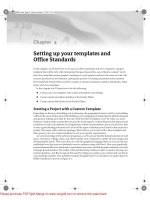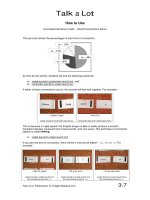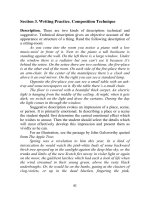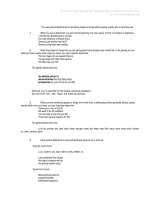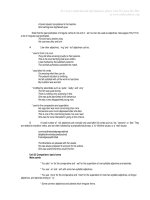Tài liệu Collins cobuild student grammar part 5 doc
Bạn đang xem bản rút gọn của tài liệu. Xem và tải ngay bản đầy đủ của tài liệu tại đây (49.38 KB, 15 trang )
For more material and information, please visit Tai Lieu Du Hoc
at www.tailieuduhoc.org
* You use `at' to talk about a place as a point.
* You use `in' to talk about a place as an area.
* You use `on' to talk about a place as a surface.
1 You use `at' when you are thinking of a place as a point in space.
She waited at the bus stop for over twenty minutes.
`Where were you last night?' - `At Mick's house.'
2 You also use `at' with words such as `back', `bottom', `end', `front', and `top' to talk about the different parts of a
place.
Mrs Castle was waiting at the bottom of the stairs.
They escaped by a window at the back of the house.
I saw a taxi at the end of the street.
You use `at' with public places and institutions. Note that you also say `at home' and `at work'.
I have to be at the station by ten o'clock.
We landed at a small airport.
A friend of mine is at Training College.
She wanted to stay at home.
You say `at the corner' or `on the corner' when you are talking about streets.
The car was parked at the corner of the street.
There's a telephone box on the corner.
You say `in the corner' when you are talking about a room.
She put the chair in the corner of the room.
3 You use `in' when you are talking about a place as an area. You use `in' with:
* a country or geographical region
When I was in Spain, it was terribly cold.
A thousand homes in the east of Scotland suffered power cuts.
* a city, town, or village
I've been teaching at a college in London.
* a building when you are talking about people or things inside it
They were sitting having dinner in the restaurant.
You also use `in' with containers of any kind when talking about things inside them.
She kept the cards in a little box.
4 Compare the use of `at' and `in' in these examples.
I had a hard day at the office. (`at' emphasizes the office as a public place or institution)
I left my coat behind in the office. (`in' emphasizes the office as a building)
There's a good film at the cinema. (`at' emphasizes the cinema as a public place)
It was very cold in the cinema. (`in' emphasizes the cinema as a building.)
5 When talking about addresses, you use `at' when you give the house number, and `in' when you just give the
name of the street.
They used to live at 5, Weston Road.
She got a job in Oxford Street.
Note that American English uses `on': `He lived on Penn Street.'
For more material and information, please visit Tai Lieu Du Hoc
at www.tailieuduhoc.org
You use `at' when you are talking about someone's house.
I'll see you at Fred's house.
6 You use `on' when you are talking about a place as a surface. You can also use `on top of'.
I sat down on the sofa.
She put her keys on top of the television.
You also use `on' when you are thinking of a place as a point on a line, such as a road, a railway line, a river, or a
coastline.
Scrabster is on the north coast.
Oxford is on the A34 between Birmingham and London.
See Unit 40 for information on `at', `in', and `on' in adverbials of time.
Unit 46 Transport prepositions
Main points
* This includes phrases like: `by bus', `in a car', `on the plane', and `off the train'.
* You can use `by' with most forms of transport.
* You use `in', `into', and `out of' with cars.
* You normally use `on', `onto', and `off' with other forms of transport.
1 When you talk about the type of vehicle or transport you use to travel somewhere, you use `by'.
by bus, by bicycle, by car, by coach, by plane, by train
She had come by car with her husband and her four children.
I left Walsall in the afternoon and went by bus and train to Nottingham.
WARNING: If you want to say you walk somewhere, you say you go `on foot'. You do not say `by foot'.
Marie decided to continue on foot.
2 You use `in', `into', and `out of' when you are talking about cars, vans, lorries, taxis, and ambulances.
I followed them in my car.
The carpets had to be collected in a van.
Mr Ward happened to be getting into his lorry.
She was carried out of the ambulance and up the steps.
3 You use `on', `onto', and `off' when you are talking about other forms of transport, such as buses, coaches,
trains, ships, and planes.
Why don't you come on the train with me to New York?
Peter Hurd was already on the plane from California.
The last thing he wanted was to spend ten days on a boat with Hooper.
He jumped back onto the old bus, now nearly empty.
Mr Bixby stepped off the train and walked quickly to the exit.
You can use `in', `into', and `out of' with these other forms of transport, usually when you are focusing on the physical
position or movement of the person, rather than stating what form of transport they are using.
The passengers in the plane were beginning to panic.
He got back into the train quickly, before Batt could stop him.
We jumped out of the bus and ran into the nearest shop.
For more material and information, please visit Tai Lieu Du Hoc
at www.tailieuduhoc.org
Unit 47 Adjective + preposition
Main points
* Some adjectives used after link verbs can be used alone or followed by a prepositional phrase.
* Some adjectives must be followed by particular prepositions.
* Some adjectives can be followed by different prepositions to introduce different types of information.
1 When you use an adjective after a link verb, you can often use the adjective on its own or followed by a
prepositional phrase.
See Unit 33 for other patterns.
He was afraid.
He was afraid of his enemies.
2 Some adjectives cannot be used alone after a link verb. If they are followed by a prepositional phrase, it must
have a particular preposition:
aware of, accustomed to, unaware of, unaccustomed to, fond of, used to
I've always been terribly fond of you.
He is unaccustomed to the heat.
3 Some adjectives can be used alone, or followed by a particular preposition:
* used alone, or with `of' to specify the cause of a feeling
afraid, ashamed, convinced, critical, envious, frightened, jealous, proud, scared, suspicious, terrified, tired
They may feel jealous of your success.
I was terrified of her.
* used alone, or with `of' to specify the person who has a quality
brave, careless, clever, generous, good, intelligent, kind, nice, polite, sensible, silly, stupid, thoughtful, unkind,
unreasonable, wrong
That was clever of you!
I turned the job down, which was stupid of me.
* used alone or used with `to', usually referring to:
similarity:close equal identical related similar
marriage:married engaged
loyalty:dedicated devoted loyal
rank:junior senior
My problems are very similar to yours.
He was dedicated to his job.
* used alone, or followed by `with' to specify the cause of a feeling
For more material and information, please visit Tai Lieu Du Hoc
at www.tailieuduhoc.org
bored, content, displeased, dissatisfied, impatient, impressed, pleased, satisfied
I could never be bored with football.
He was pleased with her.
* used alone, or with `at', usually referring to:
strong reactions:alarmed amazed astonished shocked surprised
ability:bad excellent good hopeless useless
He was shocked at the hatred they had known.
She had always been good at languages.
* used alone, or with `for' to specify the person or thing that a quality relates to
common, difficult, easy, essential, important, necessary, possible, unnecessary, unusual, usual
It's difficult for young people on their own.
It was unusual for them to go away at the weekend.
4 Some adjectives can be used alone, or used with different prepositions.
* used alone, with an impersonal subject and `of' and the subject of the action, or with a personal subject and `to' and the
object of the action.
cruel, friendly, generous, good, kind, mean, nasty, nice, polite, rude, unfriendly, unkind
It was rude of him to leave so suddenly.
She was rude to him for no reason.
* used alone, with `about' to specify a thing or `with' to specify a person
angry, annoyed, delighted, disappointed, fed up, furious, happy, upset
She was still angry about the result.
They're getting pretty fed up with him.
Unit 48 Noun + preposition
Main points
* `Of' can be used to add many different types of information, `with' is used to specify a quality or possession.
* Some nouns are always followed by particular prepositions.
1 You can give more information about a noun by adding a prepositional phrase after it.
Four men on holiday were in the car.
A sound behind him made him turn.
2 You often use the preposition `of' after a noun to add various kinds of information. For example, you can use
`of' to indicate:
* what something is made of or consists of
...a wall of stone.
A feeling of panic was rising in him.
For more material and information, please visit Tai Lieu Du Hoc
at www.tailieuduhoc.org
* what the subject matter of speech, writing, or a picture is
She gave a brief account of her interview.
There was a picture of them both in the paper.
* what a person or thing belongs to or is connected with
She was the daughter of the village priest.
The boys sat on the floor of the living room.
* what qualities a person or thing has
She was a woman of energy and ambition.
They faced problems of great complexity.
3 After nouns referring to actions, you use `of' to indicate the subject or object of the action.
...the arrival of the police.
...the destruction of their city.
After nouns referring to people who perform an action, you use `of' to say what the action involves or is aimed at.
...supporters of the hunger strike.
...a student of English.
Note that you often use two nouns, rather than a noun and a prepositional phrase. For example, you say `bank robbers',
not `robbers of the bank'.
4 After nouns referring to measurement, you use `of' to give the exact figure.
...an average annual temperature of 20 degrees.
...a speed of 25 kilometres an hour.
You can use `of' after a noun to give someone's age.
Jonathan was a child of seven when it happened.
5 You use `with' after a noun to say that a person or thing has a particular quality, feature, or possession.
...a girl with red hair.
...the man with the gun.
Note that you use `in' after a noun to say what someone is wearing.
...a grey-haired man in a raincoat.
...the man in dark glasses.
6 Some nouns are usually followed by a particular preposition. Here are some examples of:
* nouns followed by `to'
alternative, answer, approach, attitude, introduction, invitation, reaction, reference, resistance, return
This was my first real introduction to Africa.
* nouns followed by `for'
admiration, desire, dislike, need, reason, respect, responsibility, search, substitute, taste, thirst
Their need for money is growing fast.
* nouns followed by `on'
agreementattackcommenteffecttax
For more material and information, please visit Tai Lieu Du Hoc
at www.tailieuduhoc.org
She had a dreadful effect on me.
* nouns followed by `with' or `between'
connectioncontactlinkrelationship
His illness had some connection with his diet.
* nouns followed by `in'
decreasedifficultyfallincreaserise
They demanded a large increase in wages.
Unit 49 Verb + preposition
Main points
* Some verbs do not take an object and are normally followed by a preposition.
* Some verbs take an object followed by a particular preposition.
* Some verbs can take either an object or a preposition.
1 Many verbs that are used without an object are normally followed by a prepositional phrase. Some verbs take a
particular preposition:
belong to, consist of, hint at, hope for, insist on, lead to, listen to, pay for, qualify for, refer to, relate to, sympathize
with
The land belongs to a rich family.
She then referred to the Minister's report.
2 With other verbs that are used without an object, the choice of a different preposition may alter the meaning of
the clause.
agree on/withapologize for/toresult from/in
appeal for/toconform to/withsuffer from/with
They agreed on a plan of action.
You agreed with me that we should buy a car.
His failure resulted from lack of attention to details.
The match resulted in a draw.
3 With verbs that are used without an object, different prepositions are used to introduce different types of
information.
* `about' indicates the subject matter
caredreamhearspeakthink
complainexplainknowtalkwrite
We will always care about freedom.
Tonight I'm going to talk about engines.
* `at' indicates direction
